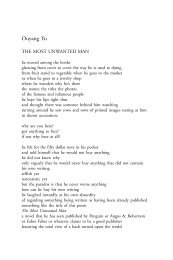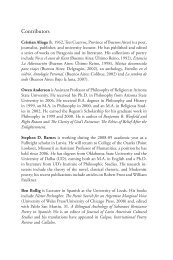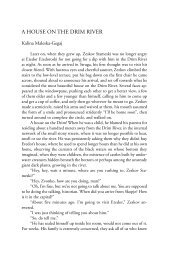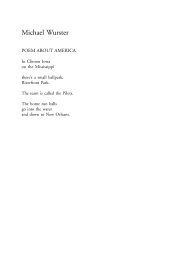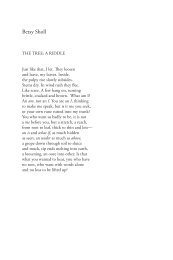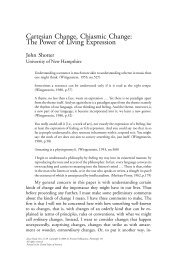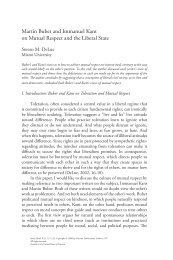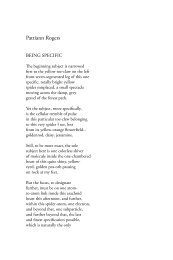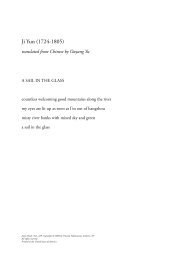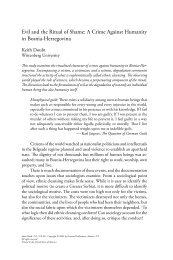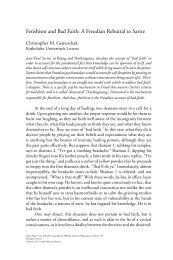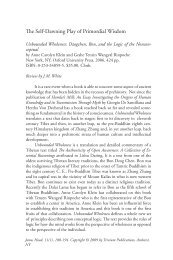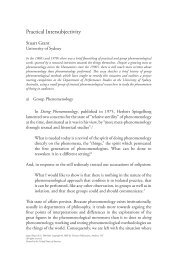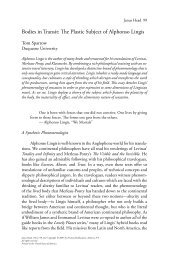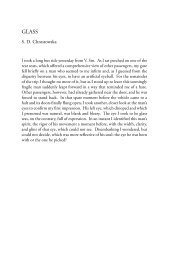Hesse's Steppenwolf: A Comic-Psychological ... - Janus Head
Hesse's Steppenwolf: A Comic-Psychological ... - Janus Head
Hesse's Steppenwolf: A Comic-Psychological ... - Janus Head
Create successful ePaper yourself
Turn your PDF publications into a flip-book with our unique Google optimized e-Paper software.
134 <strong>Janus</strong> <strong>Head</strong><br />
poor fellow. Look at his eyes,” Pablo comments to Hermine. “Doesn’t know<br />
how to laugh” (Hesse, 1974, p. 142).<br />
Pablo is a fantastic, a variation in the tradition of stock comic characters<br />
which includes the minstrel, the fool, and the trickster. He does not occupy<br />
a set place in the order of the world, but is rather a mediator between different<br />
realms, possessing knowledge of rites of passage and hidden mysteries.<br />
Pablo, who is privy to secrets about which Haller can only guess, remains<br />
a hidden mover until the novel’s finale in which he takes his place as an<br />
almost omnipotent master of ceremonies.<br />
�e period of Haller’s apprenticeship expresses a shift in the workings<br />
of the comic imagination. Just as Haller is delivered up from the inferno of<br />
his tormented isolation through Hermine’s intercession, the novel’s vision<br />
progresses to the purgatorial level with the introduction of the feminine<br />
and the communal. �e <strong>Steppenwolf</strong> has been befriended by the beautiful<br />
Hermine. Maria has brought gentleness and sensuality to his life. Even the<br />
distant Herr Pablo, eliciting Haller’s assistance in caring for a sick friend, has<br />
brought the <strong>Steppenwolf</strong> into the circle of lives which transpire behind the<br />
gay abandon of the dance floor. Love, both physical and maternal, eases the<br />
pain, suffering, and alienation which dominated the novel’s first movement.<br />
�e weeks and days before the Masked Ball are a time of waiting, full of both<br />
anticipation and sadness. “Never,” wrote Haller in this manuscript,<br />
did I experience the feeling peculiar to these days, that strange,<br />
bittersweet alteration of mood, more powerfully than on that night<br />
before the Ball. It was happiness that I experienced. . . . Within all<br />
was significant tense with fate. . . . I was conscious all the while in my<br />
heart how fate raced on at breakneck speed, racing and chasing like<br />
a frightened horse, straight for the precipitous abyss, spurred on by<br />
dread and longing to the consummation of death. (Hesse, 1974, p.<br />
179)<br />
�e approach of the Ball and the fantastic events which follow it signal yet<br />
again another shift in the level of the novel’s comic action.<br />
When the evening of the Ball finally does come, the <strong>Steppenwolf</strong> is<br />
filled with apprehension. Arriving late, he is at once taken aback by the<br />
festivities in progress. �e wolf in him wants to flee but the commitment to<br />
Hermine forces Haller to stay and search the crowded rooms for a familiar<br />
face. Hermine not to be found, Haller succumbs to the wolf and returns to



